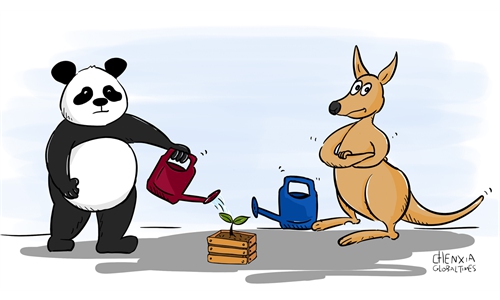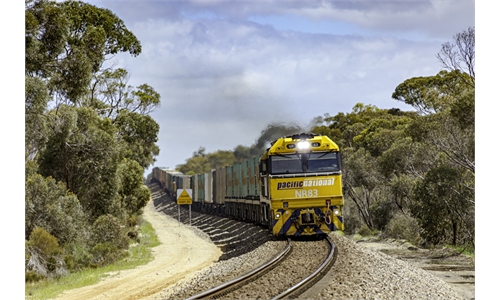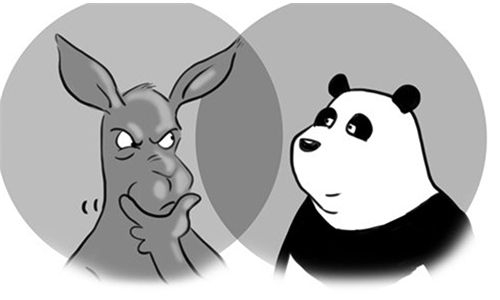
A blood moon is seen above the Sydney Opera House in Sydney, Australia, on May 26, 2021. (Xinhua/Bai Xuefei)
Many Australian products are losing market share in China to US goods, but that's what Canberra deserve given its roles as a "cannon fodder" for Washington, a spokesperson for the Chinese Foreign Ministry suggested on Tuesday.
Asked by a reporter about Australia's situation at a regular press briefing in Beijing, Zhao Lijian, the spokesperson reiterated that China would not tolerate any country to smear China, while trying to profit from the Chinese market.
The reporter noted that Australia's agricultural products were losing Chinese markets while the US' exports to China were increasing, a situation that led some Australian critics to say that Australia should treat China-Australia relations more rationally instead of blindly siding with the US.
Zhao did not name Australia by name but stressed that certain countries have been "used by others as cannon fodder" and it would only cause their people to pay the price for their governments' mistakes.
"The facts that the reporter mentioned in the question are what they deserve," he said.
Chen Hong, a professor and director of the Australian Studies Center of East China Normal University, said that Zhao's response showed the reality of Australia's dilemma.
"It shows that Australia is extremely short of political wisdom by undermining its own interests," he told the Global Times.
Yu Lei, chief research fellow at the research center for Pacific island countries of Liaocheng University in Shandong Province, also said that the Australian government is "pretending" that it does not know about the country's competition with the US in agricultural exports, but it is hurting the interests of its agricultural workers to please the US for "sectional" or even "individual" political interests.
A number of Australian products that have found major markets in China suffered last year, including wheat and coal, as bilateral relations continued to deteriorate. Meanwhile, exports of cotton, beef and coal from the US to China rose in the past several months.
According to Chen, some Australian politicians seem to have an "illusion" that China can't do without Australian goods, but this is not true. With China finding substitutes for Australian goods and Chinese people having worse feelings for Australian goods, Australian industries will see increasing losses, he said.
Some products have already shown such a trend. For example, information from major traders shows that China's imported dairy cows accounted for 60 percent of the total in 2020. Of these, about 140,972 came from Australia, accounting for 53 percent of total imports, Chinese customs' statistics showed.
But the figure was down 12 percent from a year earlier. Meanwhile, live cattle from New Zealand increased by 208.9 percent year-on-year to 37.8 percent, while live cattle from Uruguay increased by 72.9 percent to 4.2 percent of the total.
"Australia seems to delusively imagine that the present trade advantages in cows and relevant dairy products are permanent, but in fact the current disproportionate and imbalanced trade relationship between the two countries is subject to changes with the shifting economic development and industrial patterns," said Chen.
With the increase of China's domestic milk supply, it is possible for dairy products including condensed milk to reduce their dependence on imports from Australia. The production processes of these milk products are generally not complicated, and there is no problem in achieving complete domestic production, a source at the China Dairy Industry Association told the Global Times on Tuesday.
The economic losses that Australia is suffering have aroused alarm among some Australian critics, who have called on the Australian government not to blindly follow US policies toward China.
Bruce Haigh, an Australian political commentator and former diplomat, said recently he thought it's incorrect that the US will protect Australia's interests, and the Morrison government's policy toward China is "not in Australia's interest from an economic, scientific, educational and cultural perspective."
Zhao, the spokesperson, also stressed China's general policies of welcoming cooperation.
"China is always committed to carrying out economic and trade cooperation, and is willing to share development opportunities with overseas countries. However, mutual respect is the foundation and safeguard for countries to carry out pragmatic cooperation," he said.




